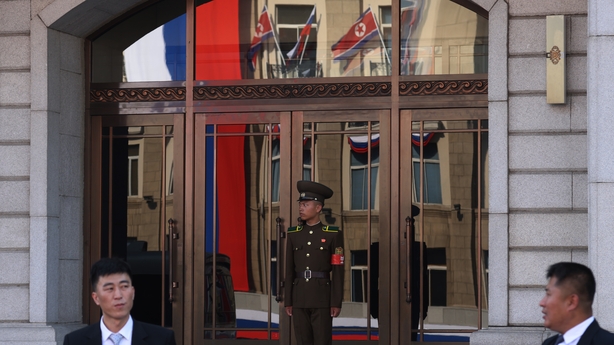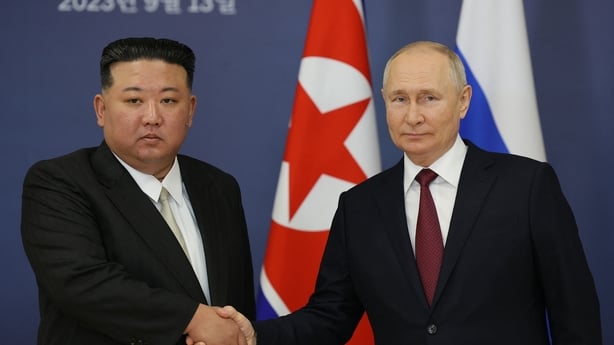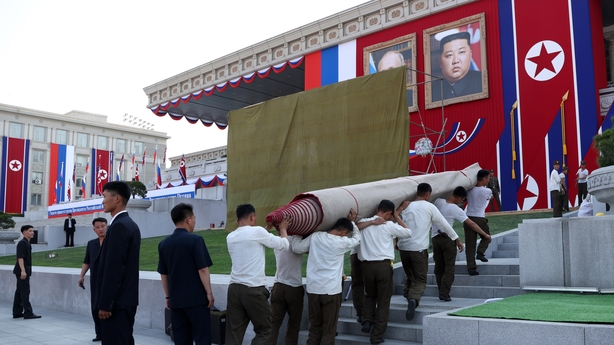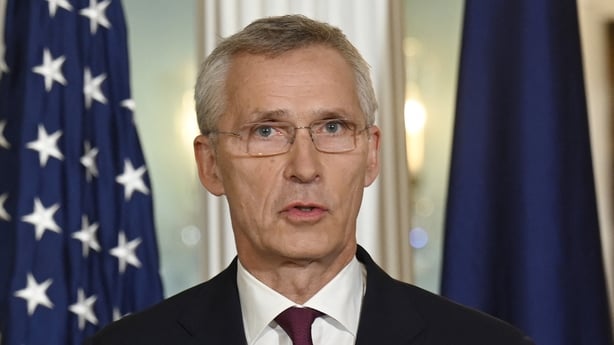Russian President Vladimir Putin arrived in North Korea for his first visit in 24 years, vowing to deepen trade and security ties with the reclusive nuclear-armed state and to support it against the United States.
Russian state media showed Mr Putin and North Korean leader Kim Jong-un shaking hands, embracing and talking beside Mr Putin's plane.
It touched down in Pyongyang around 2.45am following a stopover in Russia's far east. The leaders then travelled in the same limousine and walked together into Mr Putin's hotel.
The US and its Asian allies are trying to work out just how far Russia will go in support of the North Korean leader, whose country is the only one to have conducted nuclear weapon tests in the 21st century.
In a signal that Russia, a veto-wielding member of the UN Security Council, is reassessing its entire approach to North Korea, Mr Putin praised North Korea ahead of his arrival for resisting what he said was US economic pressure, blackmail and threats.
In an article published by North Korean state media, Mr Putin praised "Comrade" Kim, and promised to "jointly resist illegitimate unilateral restrictions", to develop trade and strengthen security across Eurasia.
"Washington, refusing to implement previously reached agreements, continuously puts forward new, increasingly stringent and obviously unacceptable demands," Mr Putin said in the article, printed on the front page of North Korea's Rodong Sinmun newspaper.
"Russia has always supported and will continue to support the DPRK and the heroic Korean people in their opposition to the insidious, dangerous and aggressive enemy."

Mr Putin issued a presidential order on the eve of the visit saying Russia was looking to sign a "comprehensive strategic partnership treaty" with North Korea.
His foreign policy adviser, Yuri Ushakov, said it would include security issues.
Mr Ushakov said the deal would not be directed against any other country but would "outline prospects for further cooperation".
Mr Putin noted the Soviet Union was the first to recognise the Democratic People's Republic of Korea founded by Kim's grandfather, Kim Il Sung, less than two years before the 1950 Korean War.
North Korean state media also published articles praising Russia and supporting its military operations in Ukraine, calling them a "sacred war of all Russian citizens".
US concerns
Mr Putin's state visit comes amid US accusations that North Korea has supplied "dozens of ballistic missiles and over 11,000 containers of munitions to Russia" for use in its invasion of Ukraine.
The White House said yesterday that it was troubled by the deepening relationship between Russia and North Korea.
The US State Department said it was "quite certain" Mr Putin would be seeking arms to support his war in Ukraine.

Russia and North Korea have denied arms transfers but have vowed to boost military ties, possibly including joint drills.
Russia is due to exceed the whole NATO military alliance on ammunition production this year, so Mr Putin's trip is likely aimed at underscoring to the US just how disruptive Russia can be on a host of global crises.
Russia in March vetoed the annual renewal of a panel of experts monitoring enforcement of longstanding UN sanctions against North Korea over its nuclear weapons and ballistic missile programmes.
Gala concert
The visit will include one-on-one discussions between the two leaders, as well as a gala concert, state reception, honour guards, document signings and a statement to the media, Russia's Interfax news agency quoted Mr Putin's aide Ushakov as saying.
Russian Defence Minister Andrei Belousov, Foreign Minister Sergei Lavrov, the ministers for natural resources, health, and transport, the heads of the Russian space agency and its railways, and Deputy Prime Minister Alexander Novak, will be part of the delegation.
Ahead of the visit, North Korea appeared to be making preparations for a possible military parade in central Pyongyang, commercial satellite imagery showed.

The summit presents the greatest threat to US national security since the Korean War, claimed Victor Cha, a former US national security official now with the Center for Strategic and International Studies.
"This relationship, deep in history and reinvigorated by the war in Ukraine, undermines the security of Europe, Asia, and the US homeland," he wrote in a report yesterday.
North Korea has been under UN sanctions for its ballistic missile and nuclear programs since 2006, and those measures have been strengthened over the years.
The UN Security Council has been divided over how to deal with North Korea.
Russia and China have said more sanctions will not help while the US and its Asian allies accuse China and Russia of emboldening North Korea by shielding it from more sanctions.
After North Korea, Mr Putin will visit Vietnam tomorrow and Thursday.
NATO concerned Russia could aid North Korea's nuclear programme
NATO is concerned about support Russia could provide for North Korea's missile and nuclear programmes, the alliance's head said as Mr Putin arrived in Pyongyang for the first time in 24 years.
NATO Secretary-General Jens Stoltenberg told a joint press conference after a meeting with US Secretary of State Antony Blinken that Russia's war in Ukraine was being propped up by China, North Korea and Iran, who all wanted to see the Western alliance fail.
"We are of course also concerned about the potential support that Russia provides to North Korea when it comes to supporting their missile and nuclear programs," Mr Stoltenberg said.

Mr Stoltenberg claimed this, and China's support for Russia's war economy, showed how security challenges in Europe were linked to Asia and added that next month's NATO summit in Washington would see a further strengthening of the alliance's partnerships with Australia, New Zealand, South Korea and Japan.
He added that there needed to be "consequences" at some stage for China.
"They cannot continue to have normal trade relationships with countries in Europe and at the same time fuel the biggest war we have seen in Europe since the Second World War," he said.

